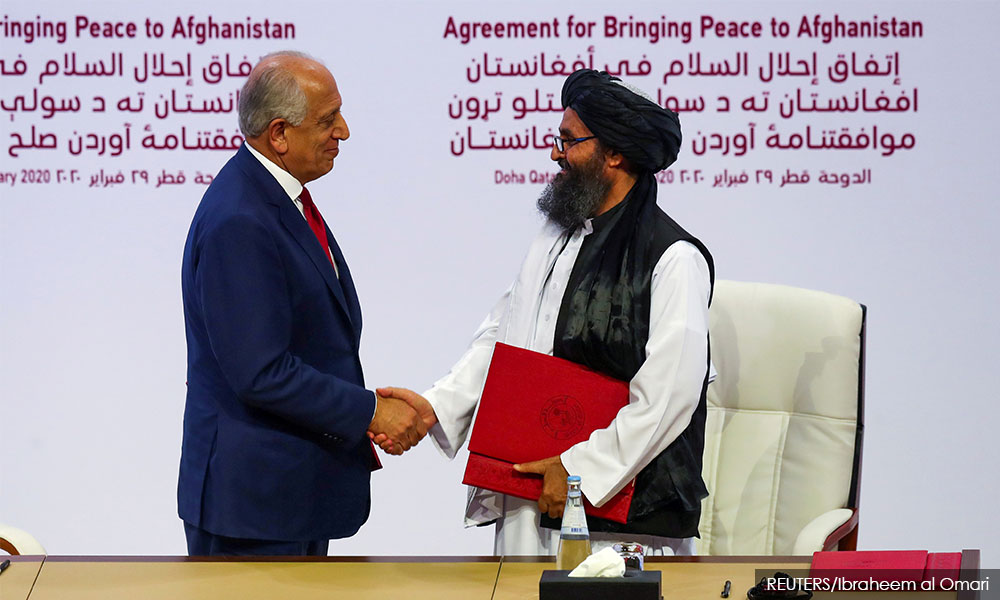LETTER | In some complex conflicts, the parties are so mistrustfully at loggerhead with each other that without "conflict mediation" or "shuttle diplomacy" direct communication between them would be difficult, though not impossible.
This was the nature of the conflict in Afghanistan before the United States started her "shuttle diplomacy" that lead to the recent inauguration of intra-Afghan peace negotiation in Doha, Qatar.
The current conflict in Afghanistan is a multifaceted one involving the Us, the Afghan government and the Taliban. In this conflict, the US and the Afghan are "strategic partners" and common antagonists to the Taliban. For about 20 years, the parties wrestled and used exhaustively all their military might but achieved nothing except infliction of great suffering to civilians. including death, injury, destructions of property, displacements and loss of economic opportunities.
The stalemate proved to the parties and the world that the conflict in Afghanistan could not be resolved through military means, so the better option would be to try pacific means including diplomacy and dialogue.
After realising this, and as part of her 1917 "South Asia Strategy", the US decided to start a "shuttle diplomacy" and in September 2018 appointed Zalmay Khalilzad, an Afghan-born American diplomat, as her special representative to lead it with an ostensible objective to end its longest and third most expensive war in Afghanistan.
Shuttle diplomacy, basically, refers to the use of a third party (intermediary) to negotiate peace between two conflicting parties that refuse to engage in direct communication with each other. The intermediary in the conflict shuttles backwards and forward successively among the parties in conflict to secure the desired result, which often not guaranteed to succeed.
The early proponent of shuttle diplomacy was Henry Kissinger, who, following the Six-Day War (Arab Israeli war of 1967), pursued simultaneously, as some writers point out, "two primary goals of the US in the Middle East, namely supporting Israel’s claim to the land she gained during that war and decreasing Soviet influence in the region."
With these goals in mind, Kissinger shuttled between different capitals in the Middle East but he told Israeli leaders something (eg, "you can keep Golan Heights") and the Arab leaders something else (eg, "US supports no claim by Israel to the Golan Heights"), while publicly he sounded a neutral peace-maker in that region.
Not sure if this is the nature of international diplomacy but surely this type of diplomacy falls within the statement of Richard Nixon (the 37th president of the US serving from 1969-1974) that “we say one thing… actually, we do another.”
Kissinger’s shuttle diplomacy succeeded in achieving US goals in the Middle East but we have to wait and see whether Zalamy Khalilzad’s shuttle diplomacy would help the US President Donald Trump’s so-called “plan victory”, as outlined in his "South Asia Strategy".

President Donald Trump did all that he could militarily to attain his "plan victory", ie, “an honourable and enduring outcome” of America’s war in Afghanistan, which he frustratingly calls “a war without victory”, but he failed. Now he is trying shuttle diplomacy to end that war, which has born some, but not all, the fruits.
Zalmay Khalilzad’s (above) shuttle diplomacy successfully brought the Taliban and the US around the negotiation table and, following nine round of negotiations, on Feb 29, 2020, they concluded a "peace agreement" that is apparently favourable to the Taliban.
Under this agreement, both parties committed themselves to an inter se ceasefire but sadly, it did not commit the Taliban to stop fighting against the government of Afghanistan.
Apparently, now there is peace between the US and the Taliban but the question is what has happened to the so-called "strategic partnership" that exists between the US and the Afghan government for about 20 years.
Some say it is dead but the Afghan government claims the partnership still holds on. Let us not forget the popular saying in the diplomatic circles that “States have no friends but partners.”
What if the US has left this partnership and become a partner with the Taliban that would certainly upset the Afghan government, as it heavily relies on US military and financial aid.
In any case, the Taliban are at peace with the US but not so with the government of Afghanistan. Zalami Khalizad’s shuttle diplomacy managed to bring the Taliban and the Afghan government around the negotiating table but the parties yet to agree on anything.
This means intra-Afghan negotiation is ongoing in Doha, Qatar, while at the same time a deadly battle is raging causing great suffering to the Afghan nation, as the parties yet to agree on a ceasefire.
Although shuttle diplomacy may not always succeed, as in the conflict between Argentina and Britain during the Falklands War in 1982, it is hoped it would succeed in resolving the conflict in Afghanistan.
So far the US shuttle diplomacy is in the right track but its success depends on whether it leads to the cessation of hostilities and the establishment of a "just and durable peace" in Afghanistan.
Until then it would be premature for the Afghan people to be thankful to the US for her shuttle diplomacy.
MOHAMMAD NAQIB EISHAN JAN is a professor at the Ahmad Ibrahim Kulliyyah of Laws, International Islamic University Malaysia.
The views expressed here are those of the author/contributor and do not necessarily represent the views of Malaysiakini.

